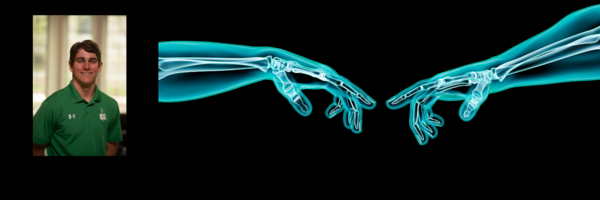
Recent Department of Electrical Engineering (NDEE) graduate, Braeden Benedict will soon be researching to find out if mankind can engineer novel solutions to brain malfunction, using electrical concepts and phenomena to heal the very organ that created and runs on them.
“To me, the most interesting intersection of electrical engineering (EE) and medicine is in the brain,” said Benedict. “There are so many things not understood, how do you begin to study it? It’s more than a question of biology, how do you interact with it?”
Benedict has recently been accepted to the Graduate Research Fellowship Program funded by the National Science Foundation. The fellowship provides tuition for three years of graduate school. He has chosen to pursue a Ph.D. in bioengineering. This month he travels back to his home state of California to begin the joint bioengineering graduate program between UC Berkeley and UC San Francisco.
Benedict aspires to develop hardware for brain implants, working on the electrical engineering side of brain-computer interface. Berkeley also offers auspicious entrepreneurial opportunities.
“It’s a promising place to be,” said Benedict.
Last summer he was at Boston Scientific, working on nueromodulation. That research further peaked his interest and led him to choose the path of graduate school.
At Boston Scientific, Benedict studied implants of the spinal cord and stimulation of Bluetooth communication.
“I built an in-house circuit board that could de-bug and improve remote control function as well as worked on battery characterization,” explained Benedict.
Benedict chose to study EE because he thought it would be a good base for an education in bioengineering.
He was right.
“I’m glad I made that decision,” said Benedict. “It’s a definite advantage having the electrical engineering education, as opposed to other engineering disciplines, when getting into bioengineering.”
The NDEE bioengineering courses he took included Introduction to Systems Biology with NDEE Professor Gregory Timp, Biophotonics and Biomedical Optics with NDEE Professor Thomas O’Sullivan and Biomedical Device Engineering with NDEE Professor Scott Howard.
“NDEE pushed me to see how I can use my skills to make a broader impact on humanity,” said Benedict.
Originally published by at conductorshare.nd.edu on June 04, 2019.